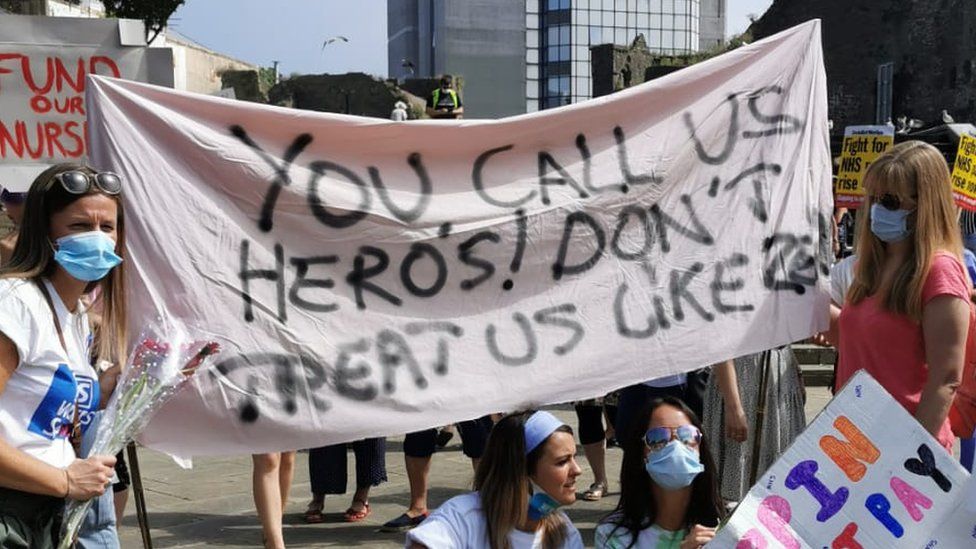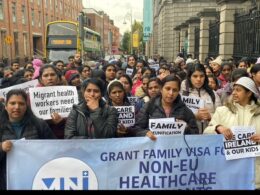By Eóin Dawson, NIPSA activist, health and social care worker (personal capacity)
The Royal College of Nursing have announced two strike days in December, on the 15th and 20th. This follows health and social care workers in several unions voting overwhelmingly in favour of industrial action. Last week’s NIPSA ballot returned a resounding 92.5% yes in favour of strike action and 97% for action short of strike.
NIPSA’s ballot gives one more of the main health service unions a strong mandate to take their members out on strike. UNISON is expected to return a similarly forceful result any day. With the announcement of the RCN strike days, it is imperative that all health unions follow that lead. Health unions have strong support from both members and the public to maximise the impact of any industrial action. It is in everyone’s interest to bring an end to industrial action, with victory for the health service and its workers, as soon as possible. This means ensuring that the Royal College of Nursing strike days are broadened to all health unions striking on these days.
The upcoming industrial action will undoubtedly have a detrimental impact on patient and service user care. Unions and health workers will, as they have always done, do everything within their power to ameliorate any potential harm. However, the impact of industrial action pales in comparison to the harm caused on a day and daily basis, which will continue to be caused for the foreseeable future, as a result of the criminal mismanagement of our health service.
Health and social care workers have struggled, overworked and on low wages for years due to over a decade of austerity and below-inflation pay deals. The pandemic revealed the depth of the crisis and the fundamental issues in health and social care. Despite talk of recovery, many services have continued to deteriorate post-pandemic. There are growing reports of services collapsing, ceasing to function or simply being withdrawn. In response, Trust bosses are drawing up increasingly desperate contingency plans.
The upcoming industrial action by health workers is formally over pay and safe staffing. However the reality is that this industrial action is a fight for the future of the health service. As it stands, health and social care services simply cannot be delivered in the same way as they were in the past. The clearest and most high profile example being the changes to the way GP services are delivered and the concerning number of surgeries “handing back their contracts”, and effectively closing. Ever-shrinking real terms budgets and overworked, underpaid staff means the constant reallocation of resources to fill gaps in urgent, frontline services. The
The net result is a fundamental change to the way health and social care is delivered. It means implosion from a universal service, to one which provides a narrow range of services delivered on an urgent and emergency basis. It is less a case of “deckchairs on the Titanic” and more a case of ripping parts off to place them elsewhere. Things we take for granted as free at the point of use will soon be lost if something is not done. GP appointments, elective surgery, early intervention services to name a few will begin to be withdrawn as free services, opening the door for privatization.
Staffing shortages were a key issue raised by health unions in the 2019 industrial action. At that time there were thousands of vacant health and social care posts. The pandemic has exacerbated this situation, with burnt-out staff leaving and increased rates of sickness absence. There is no fast or easy solution to this crisis. It takes years to fully train healthcare and allied professionals and support service workers. Furthermore, without a sufficient incentive in the form of decent pay and decent working conditions, it will be impossible to recruit to training places and vacant positions and retain staff.
Massive investment is required to train, recruit, deploy and retain health and social care staff. The reality is that the Stormont executive parties have administered the health service to the brink of destruction. The budget allocated to the Department of Health falls far short of what is necessary to avoid the looming catastrophe. A situation greatly exacerbated by private sector vultures, who continue to profit while health service crumbles.
The proposed budget for the Department of Health falls far short of the mammoth task of saving our services and is unlikely to safeguard the services from further cuts. The Stormont executive parties have demonstrated their unwillingness to do what is necessary to save the health service and so it falls to the workers in the health service and their representative unions to step forward. There is a huge well of public support for health and social care workers following the pandemic that can be drawn on to win a real victory. That means that the time is now for health unions to coordinate action in the most effective way. At the same, they must also call for patients and the public to show their support by calling for mass protests in support of striking health workers.












